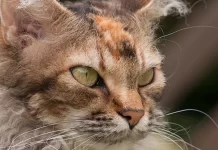Last Updated on August 29, 2023 by Fumipets
The Enigmatic Elegance of the Siberian Cat
The Siberian cat is a captivating breed known for its majestic appearance, luxurious coat, and hypoallergenic qualities. Originating in Russia, this ancient breed has adapted to harsh climates, developing a thick, water-resistant coat that’s perfect for colder regions.
Renowned for their friendly and affectionate nature, Siberian cats make wonderful companions for those seeking a unique combination of beauty and personality.
Siberian Cat
Siberian cats are indigenous to Siberia, a part of Russia noted for its protracted winters and severe climate. Their long, waterproof triple coat and sturdy bodies are a reflection of their wild beginnings.
These attentive, well-built cats have a temperament that is a little bit kitten-like. This breed is affectionate and sweet-natured. Siberians often get along well with kids and other animals, and they are completely dedicated to their pet owners.
Depending on pedigree and age, Siberian kittens often cost between $1,200 and $4,000. Why is the pricing so high? Due to the great demand for this breed and the very small number of purebred Siberian cats outside of Russia, they are quite uncommon in the United States.
Appearance
These medium-sized cats were undoubtedly designed for the Siberian woodlands where they live. Siberian cats have strong, muscular bodies that look hefty for their size, along with lengthy, triple-layered, water-resistant coats.
Any hue, including pure white, black, red, blue, and silver, may be seen in their thick covering of long hair. Additionally, they are available in a broad range of patterns, such as bi-color, calico, tabby, smoky, point, and calico. Although white Siberian cats sometimes have blue eyes, Siberian cats often have golden, green, or copper eyes.
It’s hardly surprising that these cats shed a lot given their abundance of fur. Siberian cats really go through molts twice a year: in the spring, they lose their longer, cozier winter coat, and in the autumn, they lose their shorter summer coat.
According to The Siberian Cat Club (SCC), Siberian cats are really regarded as “hypoallergenic” since their skin generates less of the substance linked to cat allergies (Fel-d1). However, a totally hypoallergenic pet does not exist, and Kirsten Kranz, director of Specialty Purebred Cat Rescue, emphasizes the importance of understanding that not everyone with allergies would benefit from having one of these cats.
Despite the fact that some individuals do find relief from cat allergies with this breed, she adds, “every year we get Siberians [at the shelter] from people who can’t tolerate them because of their own allergies.” “These cats are not a cure-all for allergies, which vary greatly from person to person.”
Spend some time with the breed before deciding whether to bring a Siberian kitten home to observe how your allergies react to it.

Temperament
Siberian cats have active dispositions and are very loving. These cats develop both physically and emotionally extremely slowly. The Siberian spends a considerable amount of their lives behaving like a kitten since it may take them up to five years to reach maturity.
Siberian cats, despite their impressionable personalities, are usually calm and quiet. When they do make noise, it’s probably going to be a little purr or chirp to show their love for their favorite persons. Speaking of favorites, pretty much everyone is loved by the Siberian. This family pet gets along well with kids and other animals, so you can rely on that.
According to Kranz, “they are generally good cats and have a wide range of personalities.” They are sweet-natured cats that we only see a few of since they are a more uncommon breed. They will likely have calm, somewhat active dispositions and traits similar to domestic cats.
These felines like challenges and new experiences. They are also skilled mousers that like scouring the area for bothersome rodents. These adorable lap cats like cuddling and spending one-on-one time with their owners when they aren’t playing or hunting.
Living Needs
Siberian cats are very sociable creatures that like their owners and often don’t fare well when left alone for extended periods of time. These animals do best in homes where people are often around and eager to play. The Siberian is friendly with most people and makes a wonderful addition to households with kids and other animals.
These sharp-witted cats like a challenge, so their living space should have both humans and toys to keep them busy and amused. Siberian cats are more than willing to get up on your lap and unwind for a bit when they aren’t playing and having fun.
These hardy cats still have some of the characteristics that made them well-suited for the outdoors. Consider the fact that many Siberian cats like water. As a result, don’t be shocked if your cat joins you in the shower or bathtub to play! He’ll also like taking harnessed tours of the globe or relaxing in the sun on his catio.
Care
To avoid a matted coat, Siberians must be combed at least three times a week, according to Natalie L. Marks, DVM, CVJ, Blum Animal Hospital, Chicago, Illinois. “Their triple coat is water-resistant, so they hardly ever need to be bathed.”
In addition to routine brushing, be sure to give your Siberian dog frequent nail trimming. His eyes and ears should be cleaned often as well.
It’s as important to keep his body moving and his mind active as it is to brush. To get these cats moving and thinking, put out toys, give them a cat tree, and engage in plenty of one-on-one play.
They require both physical and mental exercise since they are quite athletic, claims Marks.
Siberian cats are highly intelligent and can be taught to use a litter box and scratching post with ease. Make sure the litter box is large enough for these cats to comfortably use since they are on the bigger side of medium-sized. Even your Siberian can be taught a few tricks!
These creatures’ friendly disposition make them quite simple to socialize with. Siberian cats are again friendly with kids, other cats, and dogs.
To assist avoid overeating, feed your Siberian cat high-quality food and keep an eye on his consumption. To find out how much and how frequently to feed your specific cat, see your veterinarian.
Health
Siberian cats often live 8 to 10 years and make healthy pets.
“The biggest genetic risk with this breed is a slightly higher risk of hypertrophic cardiomyopathy, otherwise known as HCM,” claims Marks. The cardiac muscle enlarges and loses some of its function in this situation.
Reputable breeders will check your kitten for health problems, but it’s crucial to continue having them checked until they are adults. HCM and other health issues may not show up in your cat’s early years.

History
It would be an understatement to say that the Siberian breed has stood the test of time. According to the SCC, the history of these native woodland cats of Russia stretches back to the 13th century. According to some cat specialists, the Siberian might possibly be a long-lost progenitor of all long-haired breeds that exist today.
These wild, long-haired cats tamed through time and sought shelter in human households from the harsh Siberian winters. These devoted cats were warmly accepted by people thanks to their keen mouse skills and kind personalities.
In early 19th-century cat displays, Siberian cats were first acknowledged in European culture. The cats are still somewhat uncommon now despite the breed not being introduced to the United States until the 1990s.
Q&A: Siberian Cat
1. What is a Siberian cat?
The Siberian cat is a breed originating in Russia, known for its semi-longhaired coat, distinctive appearance, and friendly personality. They are often recognized for their hypoallergenic properties.
2. Are Siberian cats hypoallergenic?
Yes, many Siberian cats are considered hypoallergenic, producing fewer allergens than other cat breeds. Some people with cat allergies may find that they have fewer allergic reactions around Siberian cats.
3. How does the Siberian cat’s coat help in cold climates?
The Siberian cat’s coat is designed to withstand cold temperatures. It consists of a dense undercoat and longer guard hairs that help protect the cat from harsh weather conditions, making it well-suited for colder regions.
4. What is the personality of a Siberian cat like?
Siberian cats are known for their friendly, affectionate, and playful nature. They often form strong bonds with their families and can be social and interactive companions.
5. How should I care for a Siberian cat’s coat?
Regular grooming is important for maintaining a Siberian cat’s coat health. Brushing a few times a week helps prevent matting and reduces shedding. During shedding seasons, more frequent brushing may be necessary to manage the shedding.
The Siberian cat’s allure lies in its blend of striking physical features and endearing personality traits. As a hypoallergenic breed, it offers a unique option for cat lovers who may have allergies but still desire the companionship of a feline friend.
https://www.youtube.com/watch?v=odITeShYi6c


















